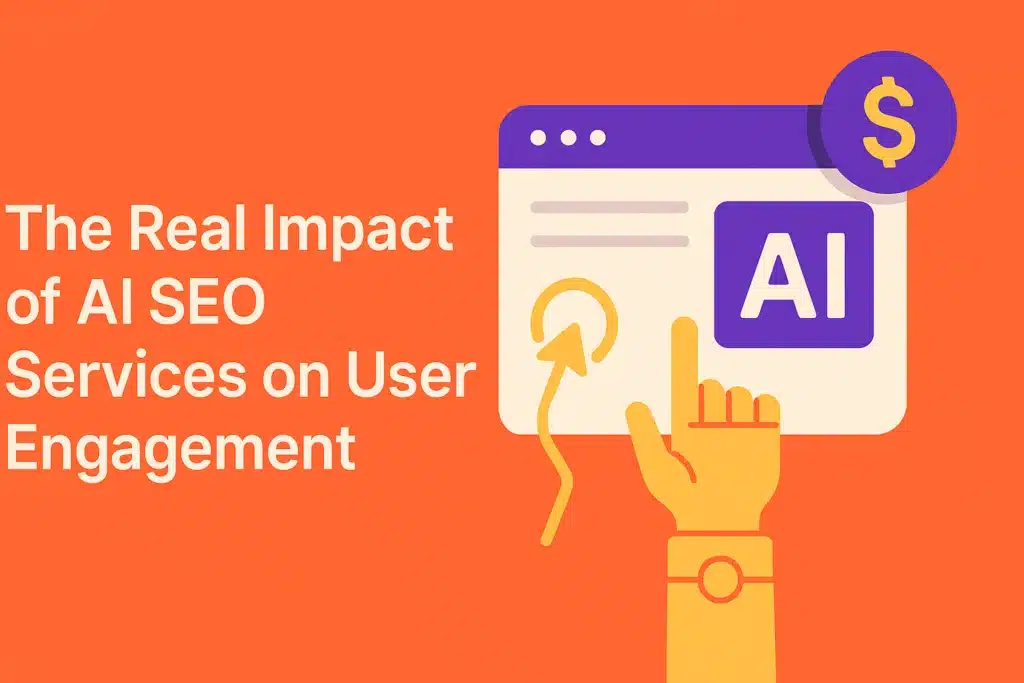Digital competition increases every day. People constantly hunt for quick, relevant results, so businesses shift toward advanced approaches. Here is where AI SEO services take center stage. They combine data study, automatic processes, and predictive insights to exactly match searcher demands. By using them, marketers boost engagement and create more effective digital strategies. User engagement thrives when content aligns with user intent. With AI, sites track user behavior in real time to refine keywords or structure. This approach encourages people to stay, click, convert.
Improve user insights with AI SEO services
Businesses increase their influence by using AI SEO services to understand audience behavior and improve content. These solutions analyze visitor trends, highlight top-performing pages, and identify user interests. By combining data findings with improvement, brands produce more custom experiences that provide better satisfaction and higher visibility, boosting overall success.
Track user engagement trends using AI data tracking
Google processes 5.9 million searches each minute, so AI data tracking help websites identify engagement spikes and adjust quickly (ResearchFDI) to user needs.
Use behavior prediction to tailor SEO strategies
AI compares competitor rankings and keywords, then predicts behavior shifts. This method adjusts SEO strategies for targeted improvements with accuracy (OWDT).
Use AI tools to understand search behavior patterns
Platforms such as SEMrush or Ahrefs analyze search intent, group keywords, and show user habits for improved improvement with continuous insights.
1. Assess their AI tech stack
Check an agency’s AI tools, data processing, and case studies. Identify successes, such as automatic technical fixes that increase traffic (MarketerHire).
Refine tone, structure, and keywords with smart tools
Platforms such as Semrush, containing 25 billion keywords, guide future marketers in changing tone, structure, and word choices for best SEO (NoGood).
Create scalable content with machine-curated suggestions
Automatic advice speed up content creation. Some businesses see at least 5% additional earnings from AI-driven approaches (Wordable). They also simplify rewriting tasks.
Enhance relevance through AI-based content improvement
Generative AI processes many keywords in seconds, grouping related topics with higher relevance for better coverage and faster content publishing (DAC Group).
Automate on-page audits for better content alignment
AI processes on-page SEO checks by identifying missing keywords or long title tags, then provides direct improvement tips (LearnWithHasan) for faster ranking.
Use AI to improve internal linking and page structure
Marketers applying AI for internal linking greatly save about 12.5 hours weekly and improve overall crawl performance (Writesonic). Page structure becomes logical.
Improve metadata and visuals based on user behavior
By checking competitor moves, AI improves metadata to increase click-through rates and aligns visuals and brand identity with user likes (OWDT).
Use smart chatbots to drive user engagement in SEO
Chatbots make websites more engaging by directing visitors toward relevant pages and providing direct answers. This help reduces bounce rates and lengthens sessions. By using chatbots for SEO upgrades, businesses collect data from user queries, which enhances their content and builds higher engagement. They boost conversions, loyalty.
Help visitors browse pages with SEO-enhanced bots
AI chatbots assist users by answering queries normally, which encourages more detailed browsing. These bots reduce bounce rates and collect data for SEO adjustments. They rely on real-time queries to find keyword ideas and enhance on-page navigation.
Answer common questions with AI-improved relevance
Google reveals 151 million results for AI chatbot queries, showing huge demand for real-time answers (DBS Interactive). AI-improved relevance means chatbots quickly meet user needs, increasing site trust and improving search rankings. They highlight concerns, which inform FAQ content.
Gather real-time feedback to refine SEO intent capture
Active chats let marketers study responses, refine SEO. Chatbots record incoming queries, highlight new content needs, and show potential site structure gaps. Through regular tracking, teams develop accurate keywords that match changing user search goals.
Advance content strategy through AI in marketing
Artificial intelligence in content marketing accelerates idea creation, matching campaigns with audience segments. It finds topics, offers angles, and enhances personalization. By combining data on user patterns, marketers focus messages exactly. This method builds loyalty and promotes lasting engagement. Teams respond quickly to changing trends.
Generate data-backed ideas using marketing AI models
Tools like ChatGPT’s Advanced Data Analysis conduct numeric checks, revealing user segments and content opportunities (MarketerInterview). This data-driven method powers campaigns, from creating approaches to creating content that appeals to specific audience interests. Marketers track purchase behavior.
Personalize campaigns based on segmented AI analysis
AI-powered segmentation divides audiences by channel usage, spending habits, or likes. Custom ads then drive conversions, matching each offer with user preferences (Number Analytics). This targeted approach increases satisfaction and builds loyalty across diverse audience segments.
Predict content trends using AI pattern recognition
Predictive data tracking analyzes user behavior to forecast future topics. Tools like Adobe Target or Dynamic Yield adjust events in real-time (WordStream). Marketers schedule content releases strategically, generating engagement and staying relevant. Such planning maximizes resources.
Plan for the future of SEO with AI-powered systems
Companies stay ahead by preparing for the future of SEO through AI new ideas. These systems identify signals, personalize content, and anticipate competitor moves. By adopting them early, brands maintain agility and keep high visibility. AI drives improvements and prepares sites for success. It prepares teams for new updates.
Use AI flexibility to stay ahead of algorithm updates
Search practices shift frequently, so AI adaptability notices changes quickly. These systems update tactics to keep visibility when algorithms change. They see competitor moves and experiment with keywords. This process protects site rankings and preserves relevance.
Invest in clear AI for more control and trust
Clear AI shows how outputs develop, allowing teams to adjust approaches, build trust. Clear models reveal data biases. With the global AI market ready for major expansion, transparent tools protect strong brand integrity and boost overall search reliability (ResearchFDI).
Move toward hyper-personalization and voice search readiness
Voice assistants gain popularity, pushing marketers to focus on speech-specific phrasing and personalized suggestions. AI adjusts user profiles and matches them with keywords, boosting visibility. This preparation lets sites engage visitors immediately and quickly capture new audiences in voice search markets.
Conclusion
AI SEO services enable brands to connect with audiences more deeply by improving content, structure, and user journeys. They transform data into insights that promote accurate targeting, improved conversion rates, and loyalty. Automated audits reveal errors, and chatbots increase engagement with help. Marketers respond to changing ranking factors, maintaining consistent online visibility. From topic concepts to refining on-page fixes, AI speeds up outcomes and unifies improvement efforts. This puts the visitor’s experience first. In the end, it leads to growth and helps businesses succeed in competitive digital spaces. Gains change how we use search.
FAQs
Questions arise when businesses evaluate AI SEO solutions. The following points address user concerns, explain value, and show how AI changes campaigns. Each answer highlights key factors that guide marketers in improving strategies and preserving search visibility.
What are the top benefits of AI SEO services today?
How does artificial intelligence in content marketing customize content?
Can AI driven on-page SEO strategies outperform traditional methods?
What is the role of using chatbots for SEO improvements?
How will the future of SEO with AI affect smaller businesses?
Are there specific tools best suited for AI SEO service use?

Ridam Khare is an SEO strategist with 7+ years of experience specializing in AI-driven content creation. He helps businesses scale high-quality blogs that rank, engage, and convert.



